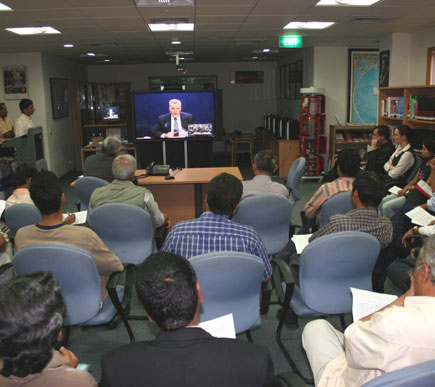
Mike Bailey, a retired US army colonel addresses a video conference from Washington DC organized by the American Center in Kathmandu. Pic by Sudhir Mahat via US Embassy.
By Dinesh Wagle
After the historic May 18 Parliamentary Declaration, the process of brining the military under the civilian control has started (though shockingly very slowly). The declaration stripped king off the post of Supreme Commander of the Royal Nepal Army and changed the name of the organization to Nepal Army. Plain and simple. But apart from the cosmetic one, there has no any substantial change taken place in the Nepal Army since the declaration. At least we don’t know what’s going on in that front. We are seeing Pyar Jung Thapa, the Chief of the Army Staff, hanging around in the Kathmandu International Airport and we just saw the chief of the Bhairabnath Battalian Rajendra Jung Kharti telling the court in writing that the battalion had never arrested nor detained Chetnath Dhungana. (Read what United Nations OHCHR had to say about the Battalion in their investigation report made public last month: Part 1 and Part 2). People believe that without firing a few dozen generals who are loyal to the tyrannical force in the country, the process of reforming the army will not get momentum.
“The process of brining the army into civilian control is going to be long and complex,” thinks a retired United States Army colonel who addressed a group of journalists, professors, former army officers in Kathmandu from Washington D.C. via a video conference yesterday. The program was organized by the Public Affairs section of the U.S. Embassy in Kathmandu. I wasn’t invited but attended the program after my newspaper (Kantipur daily) assigned me to cover the event. I went to the American Center along with Gunaraj Luintel, the news editor. The embassy has been organizing such video conferences frequently and except the technical glitches that seem to be the inseparable part of the program, the discussions are often fruitful and newsworthy. (Here is the news that appeared on the front page of the daily about the event)
Mike Bailey, associated with a security firm RONCO, suggested that the Nepal Army should make its activities and policies transparent and make the court martial proceedings accessible to the public and the press. “The more transparent the process becomes the more respect the army will gain from the public,” he said.
I could easily guess that he wasn’t much familiar with the situation of Nepal from the way he talked but a few points he made about the merging of the two armies (establishment side’s and the rebel army) was useful in Nepali context. (It would have been even better had the embassy found a person-retired- from the US military who had been to Nepal, worked with the Army here and closely observed the Maoist insurgency.)
We are also talking about the merging of peoples’ army [Maoist army) and the Nepal Army to from a new inclusive National Army. I was eager to know what Mike would think about this. “That is a long and complex process and should be handled carefully,” he said. “But we have seen that such successful execution of such mergers in many conflict affected countries around the world.”
A skeptical person, a royalist perhaps, wanted to know if it was really possible to form an independent and neutral national army by merging the Maoist army that has certain political agenda and mission with the Nepal Army. Mike spoke what the man probably didn’t want to hear. “Such a new army would be even more inclusive and representative,” the retired colonel said. “Because Maoists represent certain section of Nepali society.”
Mike also emphasized that the process of merger should be transparent and every details of the proceeding should be accessible to the public which might help address the question of peoples’ confidence over the process.
CIVILIAN CONTROL of the MILITARY
by Richard H. KohnI would like to share parts of an article that, I think, Mike read out in the beginning of the discussion. He didn’t cite the source of the article but I could follow the lines and paragraphs from the original article that I had coincidently carried with me in American Center, the venue of the program, as he started making opening statement. The article by Professor Richard H. Kohn talks about the issues that countries like Nepal are facing currently.
……….
I N T H E O R Y A N D C O N C E P T, civilian control is simple. Every decision of government, in peace and in war — all choices about national security — are made or approved by officials outside the professional armed forces: in democracies, by civilian officials elected by the people or appointed by those who are elected. In principle, civilian control is absolute and all- encompassing. In principle, no decision or responsibility falls to the military unless expressly or implicitly delegated to it by civilian leaders. All matters great and small, from the resolve to go to war to the potential punishment prescribed for a hapless sentry who falls asleep on duty, emanate from civilian authority or are decided by civilians. Even the decisions of command–the selection of strategy, of what operations to mount and when, and what tactics to employ, the internal management of the military in peace and in war–derive from civilian authority, falling to uniformed people only for convenience or out of tradition, or for the greater efficiency and effectiveness of the armed forces.…………
Civilian control has special significance today more than ever. Throughout the formerly communist world, societies are struggling to build the institutions for democratic governance. NATO has made civilian control a prerequisite for joining the Alliance. In encouraging democratization, the United States and other western powers use civilian control of the military as one measure of progress toward democratic process.
…………
Control by civilians presents two challenges today:
• For mature democracies, where civilian control has been strong and military establishments have focused on external defense, the test is whether civilians can exercise supremacy in military policy and decision-making. When the military enjoys great prestige, possesses advanced bureaucratic skills, believes that its ability to fulfill its mission may be at risk, or comes to doubt the civilian leadership, civilians can face great obstacles in exercising their authority.
• For the new or newly-emerging democracies without much experience in combining popular government and civilian control, the challenge is more difficult: to assure that the military will not attempt a coup, or defy civilian authority. In many former autocracies, the military has concentrated on internal order, or been deeply involved in political life, sometimes preying on the society rather than protecting it. Then the chief requirement is to establish a tradition of civilian control, to develop an ironclad system of political neutrality within the military establishment, and to prevent or forestall on a permanent basis any possibility of a coup or military intervention in political life.
………………
F O R D E M O C R A C Y, civilian control — that is, control of the military by civilian officials elected by the people — is fundamental. Civilian control allows a nation to base its values and purposes, its institutions and practices, on the popular will rather than on the choices of military leaders, whose outlook by definition focuses on the need for internal order and external security.The military is among the least democratic institutions in human experience; martial customs and procedures clash by nature with individual freedom and civil liberty, the highest values in democratic societies.
• The military is authoritarian, while democratic society is consensual or participatory.
• One is hierarchical, the other essentially egalitarian.
• One insists on discipline and obedience, subordinating personal needs and desires to the group and to a mission or goal. The other is individualistic, attempting to achieve the greatest good for the largest number by encouraging the pursuit of individual needs and desires in the marketplace and in personal lives, each person relying upon their own talents and ingenuity.
• One emphasizes order, conformity, harmony, and homogeneity; the other tolerates, even celebrates, disagreement and diversity of perspective.
Because their most fundamental purpose is to wage armed conflict, military institutions are designed for violence and coercion, and over the centuries have developed the organizational structure, operating procedures, and individual values needed to succeed in war. Authority in the military emphasizes hierarchy so that individuals and units act according to the plans and decisions of commanders, and can succeed under the very worst of mental and physical circumstances.Here is the original article.
Wagle has started updating his site by posting entries from his recent American trip: Wagle Street Journal

Comments
51 responses to “Bringing Nepal Army Under People: American Perspective”
My brother recommended I may like this blog. He was
totally right. This publish actually made my day. You cann’t consider simply how a lot time I had spent
for this information! Thank you!